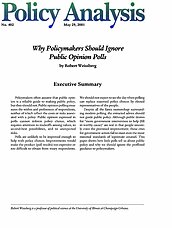Policymakers often assume that public opinion is a reliable guide to making public policy, but they should not. Public opinion polling measures the wishes and preferences of respondents, neither of which reflect the costs or risks associated with a policy. Public opinion expressed in polls cannot inform policy choice, which requires attention to tradeoffs among values, to second-best possibilities, and to unexpected risks.
Polls are unlikely to be improved enough to help with policy choices. Improvements would make the product (poll results) too expensive or too difficult to obtain from weary respondents. We should not expect to see the day when polling can replace reasoned policy choices by elected representatives of the people.
Despite all the fancy numerology surrounding modern polling, the extracted advice should not guide public policy. Although public desires for “more government intervention to help (fill in worthy cause)” are real in that people sincerely crave the promised improvement, those cries for government action fail to meet even the most minimal standards of legitimate counsel. This paper shows how little polls tell us about public policy and why we should ignore the proffered guidance to policymakers.
About the Author

This work is licensed under a Creative Commons Attribution-NonCommercial-ShareAlike 4.0 International License.
